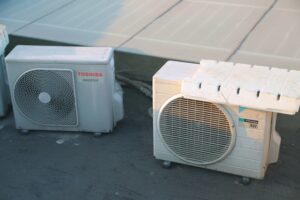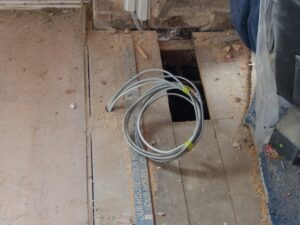Picture this: It’s a cold winter night, and your furnace suddenly stops working.
The house is getting chilly, and you’re scrambling to figure out what to do next.
Sound familiar?
Knowing who to call for furnace repair can save you from this stressful situation.
But, who should you trust to get your home back to warmth and comfort?
No one wants to deal with furnace trouble, but when it happens, you’ll want to know exactly who to call, right?
After all, a malfunctioning furnace isn’t just an inconvenience; it can leave you freezing and uncomfortable in the middle of winter.
But here’s the good news: when you reach out to a professional, you can avoid all the guesswork and get things fixed efficiently.
This is where Excel Mechanical comes in.
We’ve built a reputation for delivering reliable, high-quality HVAC services for both residential and commercial needs.
Our team specializes in getting your furnace back up and running fast—whether it’s a minor issue or a major repair—while minimizing the disruption to your daily life.
In this blog, we will talk about:
- The most common furnace problems and how to spot them early
- Why calling the right experts is essential for quick and reliable repairs
- How Excel Mechanical’s team can provide the best furnace solutions for your home
Let’s dive into what you should be looking out for and why Excel Mechanical should be your go-to choice when your furnace needs attention.
Ready?
Let’s go!
Identifying Common Furnace Problems
It’s cold outside, and your furnace should be your best friend, keeping your home warm and cozy.
But when it starts acting up, you’ll want to spot the signs early to avoid costly repairs.
Let’s break down some common furnace problems, and we’ll walk you through what to look out for so you can keep things running smoothly.
Strange Noises and Their Meanings
Your furnace may produce various noises that indicate underlying issues. Common sounds to listen for include:
- Banging or Clanking: If your furnace is making banging or clanking sounds, it could mean there’s something loose in the blower assembly or even debris getting caught. Think of it like your furnace telling you, “Hey, I’m not happy in here.” Ignoring these noises? Big mistake.
- Hissing: You know that hissing sound you hear when air is leaking from a tire? Well, your furnace might do the same thing if there’s air escaping, often from the heat exchanger. This could lead to major heating issues, so if you hear hissing, it’s best to check it out ASAP.
- Squealing: If your furnace is squealing like a rusty door, that could be a sign that the blower motor bearings need lubrication or even replacement. This squealing might seem harmless, but let it go too long, and it could be a sign of a much bigger issue down the line.
If you hear your furnace making unusual noises, investigate promptly. Ignoring these sounds can lead to more significant issues, making it essential to consult professionals like Excel Mechanical, who provide exceptional HVAC services tailored to your needs.
Dealing With Furnace Performance Issues
Now, let’s talk about how your furnace is actually working (or, not working) when it’s running.
Are you feeling that chill in the air or dealing with uneven heating?
These performance issues can be a sign that something isn’t quite right.
Here’s what to keep an eye out for:
- Inconsistent Heating: Is your furnace heating some rooms perfectly while others are freezing? This could mean there’s an issue with the limit switch or maybe a problem with the ductwork. When it comes to heating, consistency is key—if it’s not happening, it’s time to take action.
- Pilot Light Issues: A malfunctioning pilot light can prevent your furnace from igniting. It’s like trying to start a car with an empty tank—no matter how much you try, it’s just not going to work. If you notice your pilot light flickering or completely out, you’ll want to get it checked out before you end up with no heat at all.
- Frequent Cycling: If your furnace is constantly turning on and off, it could mean a malfunctioning thermostat or a problem with the limit switch. That on-off dance? It’s not normal. You shouldn’t be playing the waiting game with your heat!
Furnace Maintenance for Longevity and Efficiency
When it comes to your furnace, regular maintenance isn’t just a good idea—it’s a must.
Think about it like getting regular check-ups for your car. Without them, you run the risk of bigger, more expensive problems down the road.
The same goes for your furnace.
By keeping up with basic maintenance, you can extend its lifespan, boost efficiency, and ensure you’re not left shivering in the cold when it matters most.
Changing and Managing Air Filters
Air filters—small but mighty.
When’s the last time the filters in your furnace were changed?
If it’s been a while, you might be in for a rude awakening.
Dirty air filters restrict airflow, forcing your furnace to work overtime to heat your home. And guess what happens when it works harder than it should? Higher energy bills.
Here’s how to manage air filters like a pro:
- Choose the right filter: Opt for high-efficiency filters to capture more dust and allergens.
- Set reminders: Use a calendar or smartphone to remind you of filter changes.
- Keep track of usage: Note how often your furnace runs to determine the ideal replacement frequency.
Regularly changing your air filters can lead to better airflow, lower energy consumption, and improved air quality—helping your furnace run smoothly and efficiently.
The Importance of Regular Service
Routine furnace service isn’t just for fixing issues; it’s a preventative measure that saves you time, money, and stress.
Ever notice that your furnace doesn’t seem to heat as quickly as it used to, or maybe it’s making strange noises you haven’t heard before?
A simple service check could catch minor issues before they turn into costly repairs.
Here’s what regular service typically includes:
- Inspection of key components: This can uncover wear and tear before it leads to breakdowns.
- Cleaning the system: A thorough cleaning enhances efficiency and prolongs the life of your furnace.
- Safety checks: Ensuring all safety mechanisms are functional protects you and your home.
Investing in regular service with a trusted professional means you can enjoy peace of mind knowing your furnace is performing at its best.
Selecting a Furnace Repair Service
When your furnace stops working, or even if it’s just not performing as it should, choosing the right furnace repair service can make all the difference.
After all, no one wants to end up with a sky-high repair bill or worse, still having the same issues after the repair is done.
So, how do you choose the best service for your needs?
Criteria for Choosing the Right HVAC Professional
You wouldn’t trust just anyone with your car, right?
The same goes for your furnace.
Finding the right HVAC professional to fix your furnace is about more than just picking the first name you find in a search.
You want someone you can trust, someone who’s experienced, and, most importantly, someone who knows how to get the job done right the first time.
Here’s what to look for:
- Certification and Licensing: Make sure the HVAC professional is licensed and certified. This ensures that they’ve been trained and are up to date on industry standards. Don’t hesitate to ask for proof of certification.
- Customer Reviews: Word of mouth is still powerful. Check online reviews and ask for references to get a feel for the quality of service you can expect.
- Experience with Your Furnace Model: Not all furnaces are the same. You want to choose a technician who’s experienced with your model, whether it’s gas, electric, or oil. This can save time and prevent unnecessary complications.
- Warranty on Repairs: A reputable HVAC professional will back up their work with a warranty. This gives you peace of mind knowing that if the problem reoccurs, you won’t have to pay for another fix.
Choosing the right HVAC service isn’t just about picking a name from a list.
It’s about ensuring that you’re getting the best service and value.
Excel Mechanical is here to provide top-quality service for your furnace, ensuring that your system gets the care it deserves.
Our professionals are experienced, certified, and ready to get your furnace running like new.
Understanding Furnace Repair Costs
Let’s face it: furnace repairs can be expensive.
However, understanding what’s involved in the cost breakdown can help you avoid sticker shock and make an informed decision.
While repair costs can vary, here’s what you can typically expect:
- Minor Repairs: For smaller fixes like replacing a filter or fixing a loose part, you’re looking at a cost of around $65 to $200. These types of repairs are usually quick and straightforward.
- Major Repairs: If your furnace has a more significant problem, such as issues with the heat exchanger or a motor replacement, you might be looking at anywhere from $500 to $1,500 or more.
- Diagnostic Fees: Many companies, including Excel Mechanical, charge a diagnostic fee to come out and assess the issue. This usually runs around $75 to $150. However, this fee is often applied toward the total repair cost if you go ahead with the service.
Before any work begins, ask for an upfront estimate that includes parts, labor, and any potential fees. This helps you avoid any surprises down the line.
When to Consider Furnace Replacement
Sometimes, the best decision is to replace your old furnace rather than continue with costly repairs.
But how do you know when it’s time to say goodbye to your old unit?
The signs can be subtle at first, but with a bit of attention, you’ll know when it’s time to make the change.
Comparing Repair Costs vs. Replacement
When your furnace requires repairs, assess the cost in relation to its age and condition.
For instance, if significant repairs cost around $2,000, it’s prudent to consider replacement, especially if a new furnace averages between $5,000 and $5,500.
Key Points:
- Repair costs can range from $300 to over $1,500.
- If repairs exceed 50% of the replacement cost, replacement may be the better option.
- Ongoing repairs on an aging furnace can lead to higher energy bills.
You may also want to factor in how long the current unit is expected to last.
The national average for furnace lifespan is about 15 to 20 years.
If your furnace is approaching this age, investing in a new, more efficient unit could save you money in the long run.
Choosing Between Gas, Electric, and Oil Furnaces
The type of furnace you choose can significantly impact your home’s energy efficiency and costs.
- Gas Furnaces: Often the most popular choice, gas furnaces tend to have lower operational costs and shorter heating times.
- Electric Furnaces: These are usually easier to install and maintain but can lead to higher energy bills if electricity costs are high.
- Oil Furnaces: Less common, oil furnaces can be costly to operate and maintain, but they may provide effective heat in colder climates.
Enhancing Indoor Air Quality and System Performance
Let’s face it: we all want clean air in our homes, and that’s not just about breathing easier, but also about maintaining a healthy environment.
Did you know your furnace plays a big role in this?
A well-maintained heating system helps improve indoor air quality (IAQ), reducing allergens and pollutants that can cause discomfort or even health issues.
So, how can you enhance both your indoor air quality and your furnace’s performance?
It all starts with regular upkeep, but there are a few key steps to consider.
- Regular Maintenance: Routine furnace maintenance ensures optimal performance. Schedule professional inspections to keep your system efficient and reduce pollutants. Excel Mechanical offers expert HVAC services tailored to your needs.
- Clean Furnace Filters: Change your furnace filter regularly to improve airflow and filter out dust and allergens. A clean filter can enhance system performance and contribute to better indoor air quality.
- Addressing Dirty Ductwork: Over time, ductwork can accumulate dust, mold, and other contaminants. Consider having your ducts cleaned by professionals. This helps maintain cleaner air as it circulates through your home.
- Enhanced Ventilation: Improving ventilation can significantly impact IAQ. Ensure your home is well-ventilated without overworking your heating system. Excel Mechanical can help design an effective ventilation plan suited to your space.
Investing in your HVAC system is investing in your health and comfort. By focusing on indoor air quality and system performance, you’re ensuring a healthy, energy-efficient environment for you and your family.
At Excel Mechanical, we’re dedicated to providing systems that not only meet your needs but also help you save money while improving the quality of your living space.




